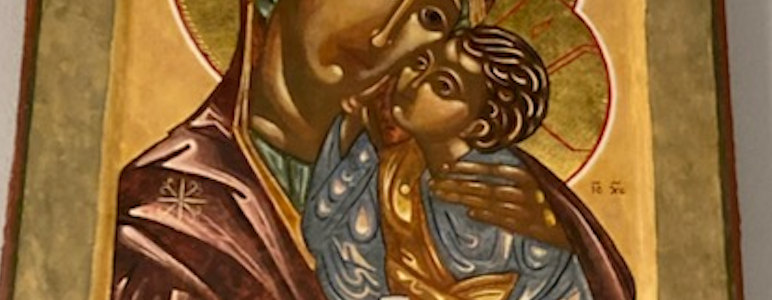Theotokos: God-Bearer
Dcn D. McManaman
And Mary treasured all these words and pondered them in her heart.
This is a very revealing line of the gospel, and it tells us something of Mary’s inner life. She treasured all these things, all that the Shepherds said regarding the message told to them by the angel who appeared, and she pondered them, treasured them. Jesus said in the gospel of Matthew: “Where your treasure is, there your heart will be also”. Where is Mary’s treasure? It’s in the gospel message of her son, and her heart was, from the very beginning and to the very end of her life, entirely focused on her son, Jesus.
Mary is Theotokos, which means “God-bearer”. She carried Christ in her womb for nine months, and after that, she carried him in her heart, by pondering the mystery that he is. And Mary was “full of grace”. That was the title used by Gabriel to address Mary. The angel did not address her by name; but rather: “Hail, full of grace”. That is the only place in the entire Scriptures where an angel addresses anyone by a title. She was full of grace right from the beginning, in the womb, because if a container is full vertically, it is also full horizontally. If Mary was full of grace as a young teenager, worthy to be addressed by a title, then she was full of grace extensively as well, right from the womb of her mother, St. Anne. And, of course, this has been the faith of the Church since the beginning: the Immaculate Conception.
If Mary was full of grace, then she was completely empty of all inordinate love of self. And thus, her prayer life was perfect, completely focused on her son, the eternal Son of God, the savior of the world. That is our purpose in this life: to become a Theotokos, a God-bearer, and John the Baptist expresses in words just what that means: “He must increase; I must decrease” (Jn 3, 30). Mary does not use that expression, because she is perfectly decreased. She said it herself in her Magnificat: “The Lord has looked with favor upon the nothingness of his handmaiden.” She saw her creaturely nothingness, embraced it totally, and so there was complete room in her soul for the fullness of divine grace to be poured into it. The rest of us, on the other hand, have to struggle to actually see and embrace our nothingness, to decrease, so that he, Christ, may increase within us. But that is something that we will never finally achieve in this life.
I remember reading from the writings of the early Greek Desert Fathers, from the 4th, 5th, and 6th centuries, and I have to be honest, I’ve never encountered such profound instruction on the inner life, on prayer and the need for constant watchfulness. As I was reading this one day, the thought occurred to me; I said to myself: “I don’t think I pray very well.” I’ve been at this for many years now, totally focused on theology and spirituality, and I turned 60 this year, and I can say at this point that “I don’t think I pray well.”
And then I remembered something. My good friend, Monsignor Tom Wells of the Archdiocese of Washington D. C, about 24 years ago, told me the very same thing. He said: “I’m beginning to realize that I don’t pray well”. He was in his mid-50s at the time, and I didn’t understand what he was talking about back then. It didn’t make sense to me; he was a very dedicated priest, did a holy hour every day, was loved by countless people, is a martyr of the Church, there is a large golf tournament in his name every year in Washington, there are about 20 priests in the Archdiocese of Washington whose vocations were inspired by this great priest, and he’s telling me that he is beginning to realize that he doesn’t pray very well.
I recall another very holy and influential priest, in his 70s, asking me to pray for him, because, he said: “the Lord is revealing to me things about myself that I’m finding very difficult to face, my superficiality, my pride, etc.…so pray for me, please, as I leave the country to see my spiritual director”. I was astounded at this; 70 years old, and this man is so far ahead of me on the spiritual life. In short, when it comes to the spiritual life, we never arrive; we are always en route.
But we must keep moving, because although we might think we’re far advanced along the way, if we have the courage to ask God to let us know just how far along we are or what is it we need to become aware of in ourselves, He will slowly, gradually, piecemeal, reveal it. It has to be piecemeal, because we couldn’t take the full truth about ourselves, we’d probably despair. But it seems to me, from listening to these two great priests and the wisdom of the Desert Fathers, we’re always very far from our goal, so far that we just might despair if it were fully revealed to us.
The good news is that there is work to do, and our life can only become more joyful, because the more we decrease, the more He increases, and as He increases in us, our lives become more joyful, and our souls become more beautiful.
Years ago, I remember being in the sacristy of a Church in the U.S, and I heard this small choir of a few young university students singing for a Mass. These were not professional singers, just amateurs. But the thought came to me as I heard them: “God must be really good to be sung to like that”. Their voices immediately directed my attention to God’s goodness. Again, they were not professional singers, just students on summer break and who were part of the regular choir during the year. And it wasn’t the type of music they were singing either; they were singing standard contemporary Church choir music. But there was something about their voices that turned my attention to God’s goodness.
Let me contrast this with a Christmas special I saw years ago, featuring Andre Bocelli, singing traditional Catholic hymns. And of course, his voice is powerful, and he’s very handsome, but I found that he was not all that inspiring. The reason is that I was too focused on the power and distinct quality of his voice, unlike those university students. But after the commercial break, a bunch of monks were on stage–not real monks, I’m guessing–, and they were dressed in what looked like traditional Benedictine monastic habits, with the hoods up. And they sounded very good. I immediately turned up the volume and thought, wonderful, I’m beginning to feel the inspiration. And then the monks started moving around in a circle, and this one monk comes to the center. And I thought: “Oh, no, please, don’t let it be”. He pulls off the hood, and it’s Andre Bocelli, and he starts belting it out.
Well, I have to be honest, the inspiration was gone. You see, now the focus was entirely upon him, and yet these hymns were written to praise and glorify God, and the hoods of the monastic habits had the effect of eclipsing the self, of decreasing, so that He may increase. Even the voice of the monk is not to be distinctive and outstanding. But Bocelli pulls off his hood. Why? Well, because it’s really about him, not God. And I think that’s an example of how beauty works; it emerges with the decrease of the self, but is eclipsed as the self increases.
Even in iconography, you are not supposed to sign the icon. As you know, in western art, the artist signs his painting at the bottom right, but the iconographer is not to do that. The writer of the icon is nothing but an insignificant instrument. But iconographers in the west have begun to sign their icons at the back, and it’s something like “written through the humble hands of so and so”. Well, that’s not supposed to be. And if those hands are so humble, then disappear and say nothing. Icons are not supposed to be entirely original either. You learn the trade from a master, and stay within the tradition, but some people have a very hard time observing that self-cancellation, and so they sign their icons.
We must decrease, He must increase. The more we decrease, the more beautiful we become, because the more room we make in ourselves for Christ, and he is supremely beautiful. It’s really about becoming Theotokos, pondering the mysteries, treasuring the Person of the Son and his words and actions, and keeping watch over our own tendency to distraction during prayer, not allowing any thought that gives rise to disordered passion. It’s about bringing stillness to the heart and focusing on the real treasure that is there waiting for us. The Lord delights when we pay so much attention to him, but our attention is often very short, thanks to a wandering thought that makes its way in. The secret to that splendor, the secret to real joy, is to become more and more like our Blessed Mother, Theotokos, God-bearer, still in the silent night of this life, pondering the miracle of Christ. Amen.



